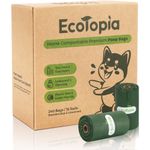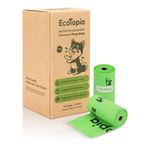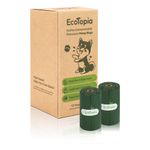In an era where microplastic pollution threatens marine ecosystems and human health, EcoTopia proudly announces its commitment to reducing microplastics through innovative products and community engagement. As a leader in biodegradable solutions, EcoTopia aims to raise awareness about microplastics and promote alternatives that contribute to a healthier planet.
The Microplastic Problem
Microplastics are tiny plastic particles less than five millimeters in size that result from the degradation of larger plastic items and are also found in various consumer products. According to the National Oceanic and Atmospheric Administration (NOAA), microplastics have been detected in oceans worldwide, posing serious risks to marine life and ecosystems.
Research indicates that microplastics are ingested by marine organisms, entering the food chain and potentially impacting human health. "The presence of microplastics in our food and water supply is alarming," states Dr. Sarah Johnson, an environmental health expert. "We need to take immediate action to address this issue before it becomes an irreversible problem."
Government and International Responses
Governments and organizations worldwide are beginning to recognize the severity of microplastic pollution. Various nations have enacted legislation to limit the use of microplastics in cosmetics, cleaning products, and textiles. The European Union has set ambitious targets to reduce plastic waste, including proposals to ban the use of microplastics in products where alternatives are available.
At the global level, the United Nations has included microplastic reduction as part of its efforts to achieve Sustainable Development Goal 14, which aims to conserve and sustainably use the oceans, seas, and marine resources. "We must unite to combat marine pollution, including microplastics," emphasizes UN Under-Secretary-General for Oceans and the Law of the Sea, Luis Vera.
EcoTopia's Commitment to Reducing Microplastics
EcoTopia is dedicated to minimizing the impact of microplastics on our environment. Our biodegradable products are designed to decompose naturally, preventing the long-lasting pollution associated with conventional plastics. "By choosing biodegradable alternatives, consumers can help mitigate the microplastic crisis," says Abner Deng.
Education and Awareness Campaigns
As part of our commitment to reducing microplastics, EcoTopia is launching educational campaigns to raise awareness about the sources and impacts of microplastics. We aim to inform consumers about the importance of selecting products that do not contribute to microplastic pollution. Our campaigns will utilize social media, community events, and partnerships with local organizations to spread the message.
"Awareness is the first step in combating microplastic pollution," states Dr. Emily Harris, an environmental activist. "By educating consumers about their choices, we can empower them to make informed decisions that benefit the planet."
Community Engagement and Action
EcoTopia believes in the power of community action to drive change. We are actively organizing beach clean-ups and educational workshops focused on the impact of microplastics. These initiatives provide opportunities for individuals to participate in hands-on activities that promote environmental stewardship.
Many community members have already joined our efforts. "Participating in the beach clean-up was an eye-opening experience," says Jessica Miller, a local resident. "I had no idea how much plastic waste was accumulating on our shores. It motivated me to make more conscious choices in my everyday life."
The Future of EcoTopia's Microplastic Initiative
Looking forward, EcoTopia is committed to innovating and expanding our product line to further reduce microplastic pollution. Our research team is exploring alternative materials and processes that can contribute to a microplastic-free environment.
"We are determined to lead by example in the fight against microplastics," emphasizes Abner Deng. "Our goal is to inspire other companies to adopt sustainable practices and prioritize the health of our oceans."
Conclusion: A Call to Action Against Microplastics
EcoTopia invites individuals, businesses, and communities to join us in the fight against microplastic pollution. By choosing biodegradable products, participating in local clean-up efforts, and spreading awareness, we can collectively work towards a cleaner, healthier ocean.





